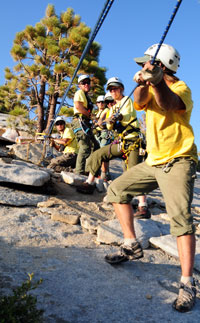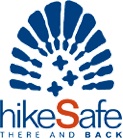Debit or Credit?
If you head out on the Atlantic Ocean in a canoe and run into trouble, the U.S. Coast Guard (USCG) will send a 110 foot cutter to rescue you. End of story.

Credit: US Park Service
This is not always the case here on land. The U.S. Park Service also maintains Search and Rescue (SAR) teams in each of the National Parks that have large wilderness and mountainous tracts. It costs each park visitor one and a half cents to maintain the SAR teams. These government agencies are supported by our tax dollars, and it seems well worth what we pay. The USCG has other responsibilities and is considered part of our armed forces. With the largest defense budget in the world, expectations that they conduct SAR activities seem reasonable. But, there’s more to it than that. There is a tradition of rescue at sea that dates back 200+ years. It’s part of our nation’s History and our values.
A comparison of SAR at sea and SAR in the mountains seems apt. However, several states have passed legislation to charge rescued individuals. Colorado was one of the first to pass a “hiker responsibility” law. If you require a rescue and are subsequently deemed to have acted in an “irresponsible” manner, you must pay the cost of the rescue. New Hampshire, in July 2014, changed a law which had been on the books since 1999 to lower the threshold for when to bill hikers for rescues. Under the original law, hikers had to engage in “reckless” behavior; now they need only be “negligent.”
Cost is a key consideration. Many of you senior snow enthusiasts out there have observed the ski patrol rescue injured skiers. Many of these are paid professionals but many also are volunteers.
The Knoxville Tennessee News Sentinel reported, “In Great Smokey Mountain National Park, total search-and-rescue costs for 2012 reached $253,550 with 104 incidents, two involving fatalities.” Hikers and climbers in European countries can purchase rescue insurance.
The results of these laws have seen two teenagers billed for $30,000 dollars for a rescue in New Hampshire’s White Mountains. In Arizona, a lost trail runner hid from SAR teams to avoid being billed.
I disagree with these laws and would like to see SAR in our woods and mountains take a more courageous stance like the USCG’s. There is a strong tradition of helping those in need and the nobility of such attitudes enriches us all.

Another answer is education. “Hike Safe” programs like New Hampshire’s are great safety tools. A hiker can apply for a hike safe card which validates they have been through proper training. This card, however does NOT protect them from being billed for a needed rescue.
The goal is to insure safety in our back country locations and not to “shame” individuals who may have taken a calculated risk and lost. Many mountain communities have selfless volunteers who participate in SAR. Let’s follow their lead and act on our values to care for those who need help. We can adopt the concepts and traditions of the Coat Guard to back country and mountain rescues. Get rid of “hiker responsibility laws”.
Editor Note: These comments reflect the views of veteran mountain and hiking expert Steve Hines and are not those of SeniorsSkiing.com. Steve is a wilderness guide, Wilderness First Responder and a volunteer trip leader for the Appalachian Mountain Club.












I think a European approach would be better, where outdoor enthusiasts, usually through hiking/climbing associations, are expected to purchase rescue insurance that usually comes with membership in the association. While the cost is modest, it drives home the point that individual responsibility is paramount in the outdoors. With the advent of modern communications, more and more rescues are being triggered by unprepared and clueless individuals, who think that the loss of a cell phone signal is grounds for a rescue.
I agree with you Scott — on all points. However, we have also made outdoor adventures accessible to all and have even encouraged it, Groups from the Sierra Club to the Appalachian mountain club “sell” the outdoors to us and we buy it. In addition to hiker insurance I think massive education campaigns would go a very long way to reducing the number of “dumb” SAR operations.
Since I first wrote this op/ed piece, I have many conversations with hikers/climbers as well as others non involved in the sport. Most people I’ve spoken react in two categories. First, is about how ill prepared or reckless hikers should pay the price of their negligence. I call this reaction the “shame and blame them” factor. If an ill prepared hiker needs help, that enough will teach them the lesson they need to learn. The second reaction is the “Well who should pay for the rescue?”. My answer to this question has become, “compassionate fellow citizens”. Thoughts?